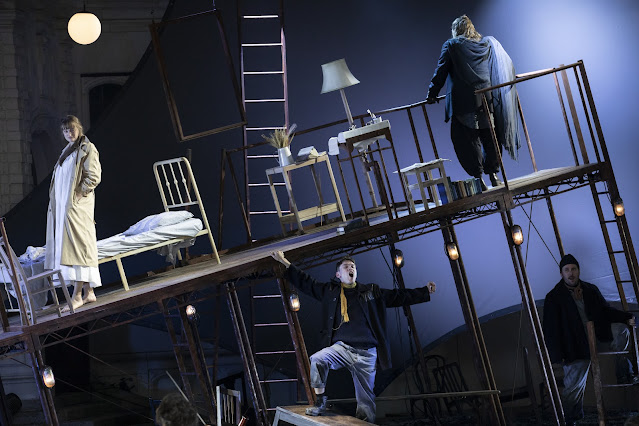 |
| Wagner: Der fliegende Holländer – Eleanor Dennis, Paul Carey Jones – Opera Holland Park (Photo: Ali Wright) |
Wagner: Der fliegende Holländer; Paul Carey Jones, Eleanor Dennis, Robert Winslade Anderson, Neal Cooper, Angharad Lyddon, Colin Judson, director: Julia Burbach, City of London Sinfonia, conductor: Peter Selwyn; Opera Holland Park
Reviewed 29 May 2025
The company’s first venture into Wagner is a triumph, combining the mythic with the personal in a production that filled the auditorium with vivid drama yet had a quiet intensity in the more intimate moments.
Opera Holland Park opened its 2025 season with a new production of Wagner’s Der fliegende Holländer, the most compact of his mature music dramas, though this still represented a significant increase in scale for the company with a large chorus with larger than usual orchestral forces. Not only was this Opera Holland Park’s first staging of Wagner, but there were two debuts in the cast with Paul Carey Jones (an experienced Wotan most recently at Longborough) making his debut as the Dutchman and Eleanor Dennis singing her first Senta (building on previous experience at Longborough, and as Eva in Die Meistersinger with Saffron Opera Group).
To stage the work, Opera Holland Park turned to the team of director Julia Burbach and conductor Peter Selwyn, who were responsible for Grimeborn Opera Festival’s fine Ring Cycle [see my review], with the City of London Sinfonia in the pit. We caught the second performance on 29 May 2025, with Paul Carey Jones as the Dutchman, Eleanor Dennis as Senta, Robert Winslade Anderson as Daland, Neal Cooper as Erik, Angharad Lyddon as Mary and Colin Judson as the Steersman.
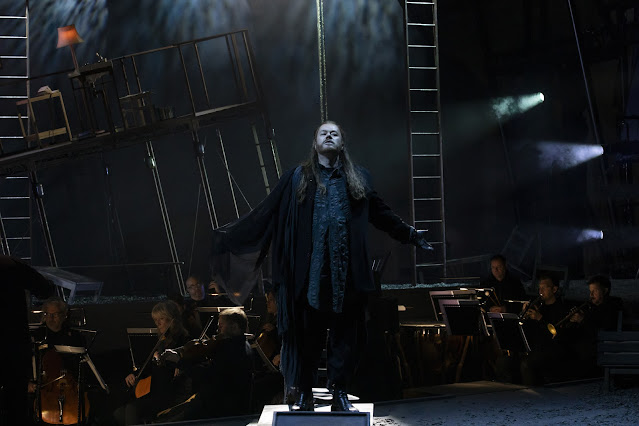 |
| Wagner: Der fliegende Holländer – Paul Carey Jones – Opera Holland Park (Photo: Ali Wright) |
Naomi Dawson‘s fixed set depicted a world gone awry with nothing quite true and a vast ramp presenting Senta’s room at an alarming angle. There was nothing sea-going about it, yet, Dawson and Burbach managed to vividly suggest the sea and the ships where necessary, making full use of the whole Opera Holland Park stage, the chorus scenes in Acts 1 and 3 really have the whole stage erupting into action. Sussie Juhlin-Wallen‘s costumes were modern without making too much point, whilst the Dutchman wore an outfit that merged the trendy with a suggestion of the East, creating a definite otherness to the character.
The large chorus (30-strong main chorus plus 12 off-stage chorus) were used more than usual. During the overture and in Act 1, the women of the chorus were clones of Eleanor Dennis’ Senta, women who have failed the Dutchman in the past, drifting aimlessly and re-enacting the past. Here and in Act 3, men from the off-stage chorus contributed to the supernatural element as faceless ghosts wandering the stage. Vocally the chorus were on terrific form, and the scene before the Dutchman’s ship in Act 3 turned almost into a frenzy only to be punctuated by the sound of the off-stage chorus (amplified alas, thus removing something of its aural magic). As this was modern dress, we had no spinning in Act 2 and Burbach wisely did not try to replace the spinning with something more modern, relying instead on the histrionic talents of the women’s chorus taking over the stage.
This was definitely not a production that attempted to shoe-horn the opera into an everyday story of fishing folk, the mythic element was strong throughout. Yet, in the more intimate scenes, the Dutchman’s solo, the long dialogue between Daland and the Dutchman, and the crucial Act 2 scene between the Dutchman and Senta, Burbach kept everything simple, focusing on the singers and giving them the space they needed. Only at the end was I slightly disappointed, but then perhaps it was wise for Burbach to choose to have her two protagonists simple depart and leave the final word to Wagner’s music.
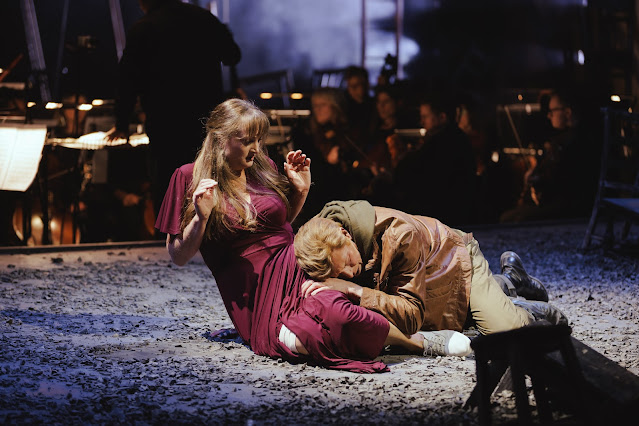 |
| Wagner: Der fliegende Holländer – Eleanor Dennis, Neal Cooper – Opera Holland Park (Photo: Pablo Strong) |
Eleanor Dennis’ Senta was present for the whole of Act 1. The staging of the overture had focused on her (and the ghost Sentas), and throughout the drama she was present in her room, almost as if this Senta had dreamed up the Dutchman as an example of her fervid fantasy. When it came to the ballad, Dennis revealed a lithe and engaging voice that seemed to easily combine youthful flexibility with an ease over the orchestra. Her ballad arose out of her monomaniac dreams, and in her interactions with Paul Carey Jones’ Dutchman she kept up this feeling of dreamlike intensity. Only at the end, with Burbach’s staging lacking the right element of catharsis, did we feel that this Senta evaporated rather than affirmed.
From his first entry, Paul Carey Jones looked the part of the restless yet sexually charged wanderer, remote yet highly seductive. He sang the Dutchman’s long solo with a vibrancy and focus that brought Wagner’s music alive, yet allied with a fine flexibility of line. Carey Jones’ voice seemed to encompass the role with ease and without force. He has sung a wide variety of roles at Holland Park and this was an interpretation that brought out the bel canto influences in Wagner’s writing. Physically he seemed a little stiff at times, though this worked in terms of the otherness of his character. His connection to Dennis’ Senta was palpable, yet their long scene together was definitely rooted in the mythic intensity of their story rather then present day physical passion.
Robert Winslade Anderson was a warmly sung, eager Daland, his voice admirably contrasting with that of Paul Carey Jones, with Winslade Anderson creating a sense of the bluff and homely. The only problem was that this Daland came over as a bit too bluff and warm, he seemed to pleasant for the character who happily sells his daughter to a stranger, too approachable and not nasty enough. Neal Cooper’s high-tension tenor gave his Erik a feeling of rough intensity, lending a feeling of desperation to his two scenes with Dennis’ Senta. The benefit of this was that we felt more sympathy than usual, but in the more tender moments in their Act 3 scene, Cooper struggled with the music’s more lyrical character.
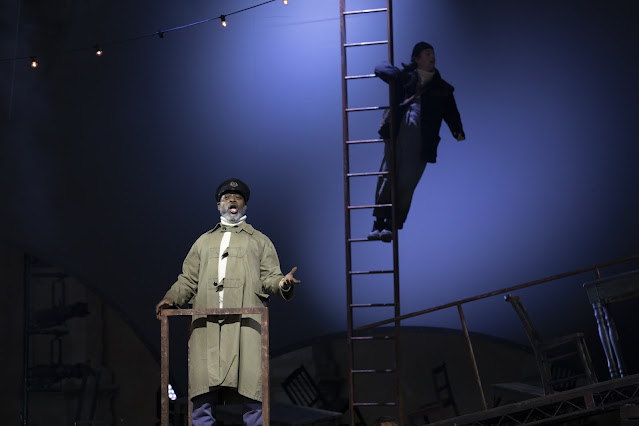 |
| Wagner: Der fliegende Holländer – Robert Winslade Anderson – Opera Holland Park (Photo: Ali Wright) |
Colin Judson made a robust, characterful Steersman, very much the older, careworn sailor rather than a youthful lyric tenor. Angharad Lyddon as Mary did her best with this underwritten role, making you regret Wagner did not give her more to do.
With a production that encompassed both stage and forestage surrounding the orchestra, the performance was not without logistical challenges when it came to ensemble but overall the way singers and players filled the auditorium with visceral drama was impressive. Though the orchestration was somewhat reduced, there was still plenty of heft (three horns, two trombones and two trumpets) though perhaps a few extra strings might have been ideal. There were occasional rough edges which suggested that Wagner was not quite in the orchestra’s blood. Peter Selwyn leaned into the lithe sound and conjured a sense of impulse and drama.
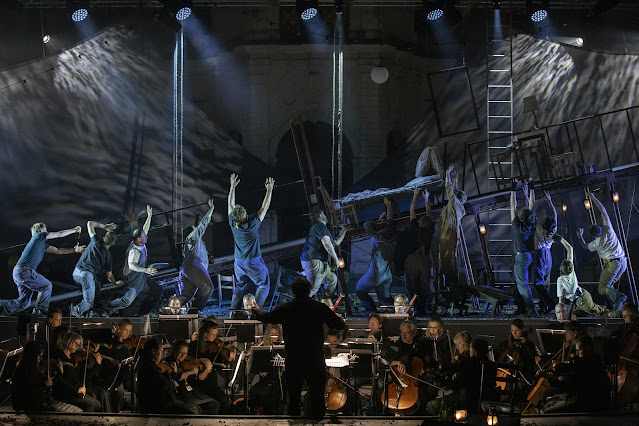 |
| Wagner: Der fliegende Holländer – Opera Holland Park (Photo: Ali Wright) |
There are a lot of Dutchmen around at the moment. Opera North debuted a new production in February this year [see my article] and Welsh National Opera plans the work as part of its birthday celebrations next year, and I can hardly imagine that Wagner’s operas will become a regular occurrence in this theatre. But this production demonstrated an impressive capability for capturing the essence of Wagner’s large-scale drama without losing the ethos that the company has developed.
The blog is free, but I’d be delighted if you were to show your appreciation by buying me a coffee.
Elsewhere on this blog
- The final concerts in this year’s Norfolk & Norwich Festival fell to the BBC Singers and the Britten Sinfonia – welcome visitors and, indeed, no strangers to the city – concert review
- Powerful stuff: Opera North’s concert staging of Verdi’s Simon Boccanegra, an evening filling the Royal Festival Hall with drama – opera review
- Something juicy that you can get your teeth into: composer Libby Croad chats about The Brontë Suite which gets its UK premiere in June – interview
- Colour & imagination: Rameau’s Pigmalion plus music from Les Boréades, Early Opera Company at Temple Music – opera review
- A near-perfect triptych: in Paris, Christof Loy conjures atmosphere inspired by film for Puccini’s Il Trittico conducted by Carlo Rizzi – opera review
- A carefully curated programme rather than a disc to dip into: Christopher Gray on his first disc with the Choir of St John’s College, Cambridge – interview
- A Hoffmann to remember: Angela Denoke’s production of Offenbach’s final masterpiece at Oldenburg Staatstheater with Jason Kim – opera review
- Requiem A is much more influenced by Swans, Godspeed You! Black Emperor, & Sigur Rós: composer Sven Helbig in his new work – interview
- A conversation between similarities & differences: Jonathan Sells on his disc of Bruckner & Gesualdo with the Monteverdi Choir – interview
- The sheer joy of performing together: Music in Secondary Schools Trust’s 12th Annual Concert – concert review
- Home


%20Ali%20Wright-28.jpg?w=998&resize=998,665&ssl=1)





